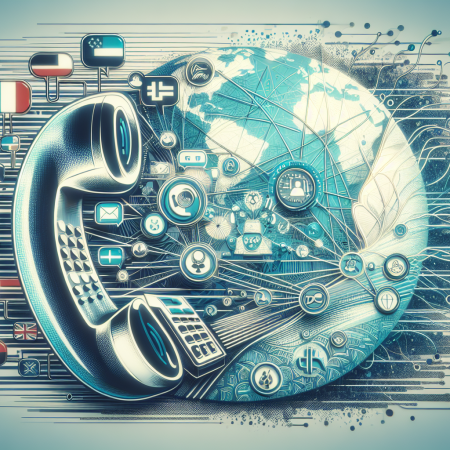Understanding Telephone Interpretation Services
Bridging the language gap in our increasingly global society is crucial, and one of the ways this is accomplished is through telephone interpretation services. These services facilitate real-time communication between different language speakers, enabling effective interaction irrespective of the geographical location or language spoken.
Defining Telephone Interpretation
Telephone interpretation refers to the provision of real-time language interpretation over the phone. This service enables individuals to communicate effectively in different languages without the need for the interpreter to be physically present. It's an integral part of certified translation services, offering an efficient solution for language barriers in various sectors.
Benefits of Telephone Interpretation
The advantages of telephone interpretation services are manifold and they contribute to their growing popularity. Here are some key benefits:
- Convenience and Accessibility: These services can be accessed from anywhere with a telephone connection, eliminating the need for physical presence or travel.
- Cost-effectiveness: Compared to in-person interpretation services, telephone interpretation is more affordable as there are no travel expenses or additional fees for on-site interpretation (Languagers).
- Availability: Telephone interpretation services are typically available 24/7, providing immediate access to interpreters whenever needed, regardless of time zones or geographical locations.
- Confidentiality and Privacy: These services ensure confidentiality and privacy, as the interpreter is not physically present and the conversation is securely conducted over the phone (Languagers).
The convenience, cost-effectiveness, and immediate availability of telephone interpretation services make them an invaluable asset to individuals and organizations alike. Whether it's for medical document translation, legal document translation or any other specialized field, these services play a pivotal role in facilitating effective cross-language communication.
Telephone Interpretation in Different Industries
The use of telephone interpretation services is increasingly prevalent across various industries. By providing real-time language interpretation over the phone, these services allow individuals to communicate effectively in different languages (Languagers).
Healthcare Sector
In the healthcare sector, telephone interpretation services can play a critical role in ensuring effective communication between patients and healthcare providers who do not speak the same language. By ensuring clear and accurate communication, these services can contribute to better patient outcomes.
Patients themselves have rated interpretation services highly, regardless of the method of provision, highlighting the value of these services in enhancing patient care (NCBI). Therefore, the use of medical translation services can be an essential part of delivering high-quality healthcare to diverse patient populations.
Business Sector
For businesses that serve a diverse customer base, telephone interpretation services can be instrumental in facilitating effective communication with non-English speakers. These services can also help businesses comply with legal and regulatory requirements by ensuring that all customers have access to necessary information and services.
With immediate access to interpreters in a wide range of languages, businesses can communicate effectively with non-English speakers, enhancing customer experience and fostering strong client relationships.
Education Sector
In the education sector, telephone interpretation can help bridge the language gap between educators, students, and parents who speak different languages. By facilitating real-time communication, these services can ensure that all parties are on the same page and can contribute to a more inclusive and supportive educational environment.
Whether it's parent-teacher meetings, school announcements, or support for non-English speaking students, telephone interpretation services can play a key role in fostering effective communication and enhancing educational outcomes.
Travel and Tourism Sector
In the travel and tourism sector, telephone interpretation services can be invaluable in providing assistance to international tourists who do not speak the local language. Whether it's understanding local customs, seeking directions, or dealing with emergencies, these services can ensure that travellers have the support they need to navigate safely and enjoy their travel experience.
With 24/7 availability, these services can provide real-time communication support at any time, including emergencies or time-sensitive situations (Languagers).
In conclusion, telephone interpretation services can have a significant impact across various industries, enhancing communication, fostering inclusivity, and contributing to better outcomes. As the demand for these services continues to grow, it's crucial for businesses and organizations to understand their benefits and potential applications.
Technical Aspects of Telephone Interpretation Services
When considering telephone interpretation services, it's essential to understand the technical aspects that make these services a preferred choice for many individuals, businesses, and institutions. These aspects include accessibility and convenience, cost-effectiveness, and confidentiality and privacy.
Accessibility and Convenience
Telephone interpretation services offer unparalleled convenience and accessibility. As Languagers points out, these services can be accessed from anywhere with a telephone connection, eliminating the need for physical presence or travel. This means that whether you're at home, in an office, or on the go, you can connect with an interpreter exactly when you need one.
In addition, these services are available 24/7, providing immediate access to interpreters whenever needed, regardless of time zones or geographical locations. This makes telephone interpretation services ideal for situations that do not require face-to-face interaction, such as phone calls, conferences, or meetings.
Cost-effectiveness
Another significant advantage of telephone interpretation services is their cost-effectiveness. Compared to in-person interpretation services, telephone interpretation services are substantially more economical as they eliminate travel expenses and reduce the need for scheduling appointments. This makes these services a budget-friendly option for both businesses and individuals who require frequent interpretation services. For other cost-effective translation options, check out our certified translation services.
Confidentiality and Privacy
Lastly, telephone interpretation services ensure confidentiality and privacy. As the interpreter is not physically present and the conversation is securely conducted over the phone, there's an added layer of privacy that may not be present in face-to-face interactions. This aspect is particularly important for sensitive discussions or when dealing with confidential information.
These technical aspects demonstrate why telephone interpretation services are a game-changing tool in today's global communication landscape. By offering accessibility, cost-effectiveness, and confidentiality, these services help businesses and individuals bridge language gaps efficiently and effectively. Whether you're seeking medical translation services or legal document translation, telephone interpretation can be a valuable resource.
Challenges of Telephone Interpretation
While telephone interpretation services offer numerous advantages, they also come with their own set of challenges. These range from potential miscommunication to issues with connection quality and cultural sensitivity.
Potential Miscommunication
One of the primary challenges in telephone interpretation is the prospect of miscommunication. The absence of visual cues in phone interviews can significantly increase the likelihood of misunderstandings. Additionally, external factors such as poor acoustics and an inadequate understanding of telephone interpreting among parties can also lead to communication problems (Source).
For instance, in certain contexts such as medical translation services, these communication problems can directly impact the quality of care for patients. Therefore, it's crucial to ensure a clear and efficient line of communication when using telephone interpretation services, and to consider alternate solutions like certified translation services when necessary.
Quality of Connection
The quality of the connection can be a major factor impacting the effectiveness of telephone interpretation services. Factors such as network reliability, call clarity, and the presence of any background noise can affect the quality of the interpretation (Languagers).
In the event of poor connection quality, the interpreter might miss or mishear crucial information, potentially leading to inaccuracies in the interpretation. To mitigate this, it's important to ensure a stable and clear connection before starting the interpretation process.
Cultural Sensitivity and Understanding
In the realm of interpretation, cultural sensitivity and understanding are just as important as language proficiency. However, in telephone interpreting, healthcare providers and interpreters often operate independently, viewing the interpretation process as a word-for-word conversion rather than a collaborative effort. This can hinder the interpreter's ability to convey cultural nuances and context effectively (Source).
To overcome this challenge, it's important to create a collaborative environment where interpreters are viewed as cultural liaisons rather than mere language converters. By doing so, it's possible to enhance the quality of telephone interpretation services and ensure a more accurate and effective communication process.
Despite these challenges, telephone interpretation has proven to be invaluable, especially in recent times. Particularly during the COVID-19 pandemic, it has facilitated essential services such as healthcare by minimizing face-to-face contact and enabling effective communication (Source). As with any service, understanding its limitations and potential issues is key to making the most of it and working towards continuous improvement.
Improving Telephone Interpretation Services
The enhancement of telephone interpretation services hinges on a collaborative approach, targeted training for effective communication, and the smart use of technological advancements. These elements are key to addressing current challenges and ensuring the continued value of these services for diverse sectors.
Collaborative Approach
Often, telephone interpretation is seen as a unilateral process, with interpreters viewed as standalone channels for word-for-word conversion. Such a mechanistic perception can pose barriers to productive engagement between interpreters and service users, particularly in healthcare (Source).
To rectify this, a collaborative approach is needed. Interpreters should be regarded as critical team members who work in concert with other parties involved in the communication process. Encouraging open dialogue and feedback between interpreters, service providers, and clients can enhance understanding, reduce miscommunication, and foster better working relationships.
Training for Efficient Communication
Effective communication is crucial for the quality of telephone interpretation services. However, external factors like poor acoustics and the lack of visual cues can pose challenges and impact the quality of interpreted information.
Training programs focused on telephone interpreting skills can equip interpreters to handle such challenges proficiently. These programs should cover areas like voice modulation, effective listening, understanding and addressing cultural nuances, and managing technical issues. Furthermore, educating service users about the nuances of telephone interpretation can promote smoother interactions and better outcomes.
For those seeking certified translation services, it's crucial to ensure that the selected certified translator has undergone such specialized training.
Leveraging Technological Advancements
Technological advancements can play a pivotal role in enhancing telephone interpretation services. While these services offer numerous benefits including cost-effectiveness, accessibility, and a wide range of language options (Certified Languages International), technology can further augment their value.
For instance, the use of high-quality acoustic equipment can improve the clarity of audio, reducing communication barriers caused by poor sound quality. Additionally, advanced scheduling systems can streamline the process of arranging interpretation sessions, making it more convenient for both interpreters and service users.
Moreover, incorporating artificial intelligence (AI) and machine learning (ML) can help in the real-time analysis of interpretations, which can be beneficial for quality control and training purposes. It's also worth exploring how advancements in video technology could complement telephone interpretation, providing visual cues that could enhance understanding.
In the end, the true value of telephone interpretation services lies in their ability to facilitate clear and effective communication across language barriers. By fostering collaboration, investing in training, and harnessing technological advancements, these services can continue to empower communication in our increasingly globalized world. Learn more about certified translation services and how they can cater to your specific needs.






